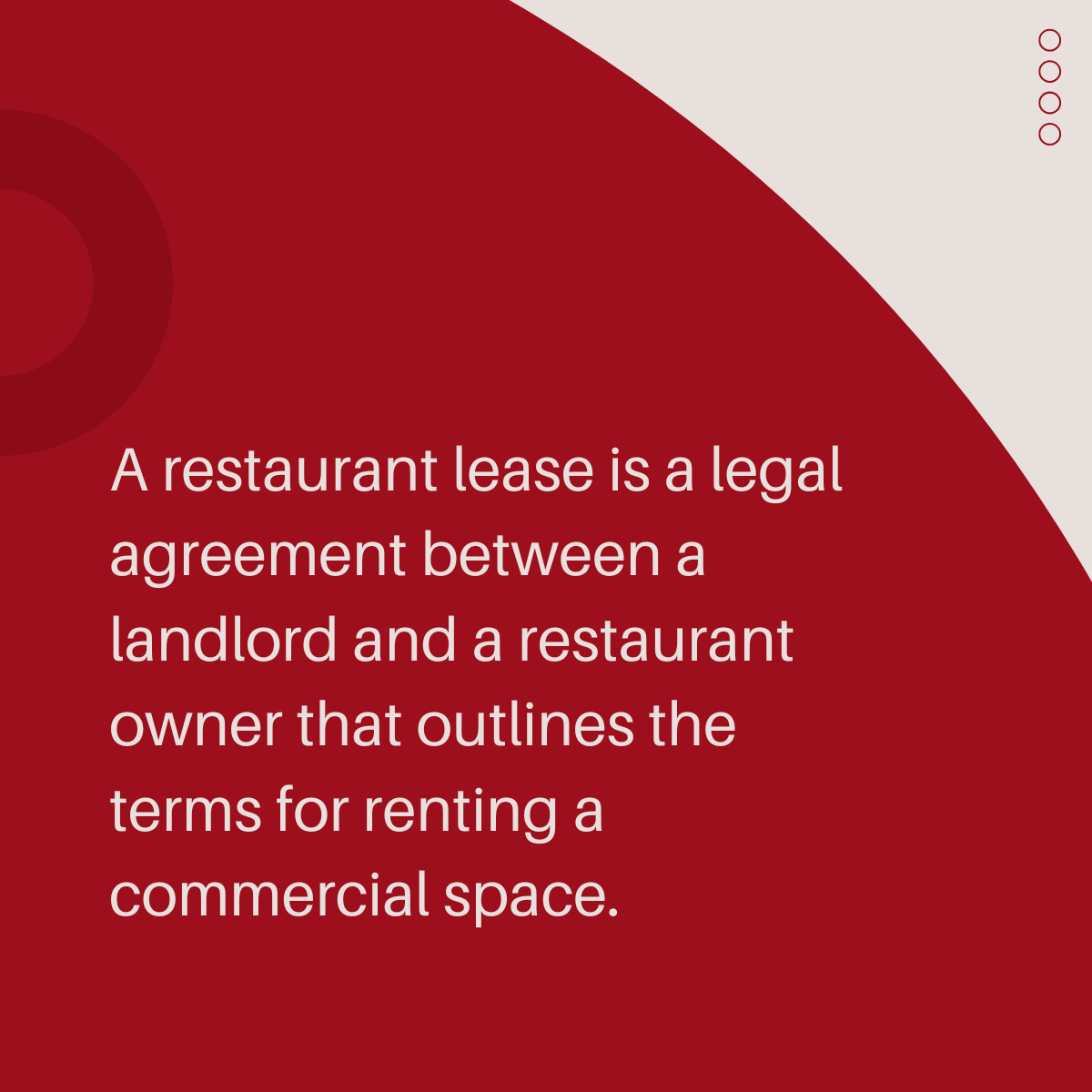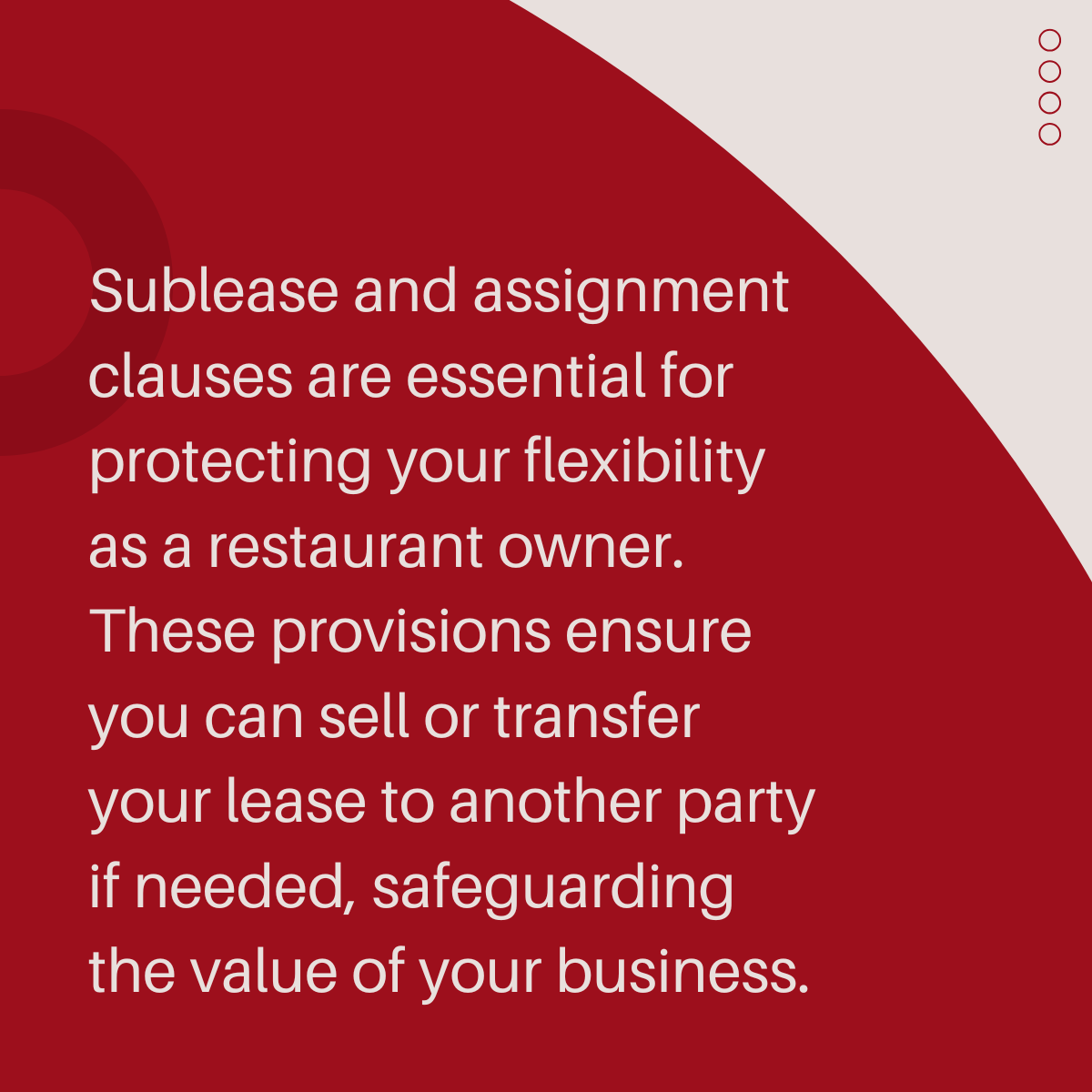
How to Negotiate a Restaurant Lease
*THE INFORMATION INCLUDED IN THIS BLOG POST IS FOR INFORMATIONAL PURPOSES ONLY AND DOES NOT CONSTITUTE ADVERTISING, A SOLICITATION, OR LEGAL ADVICE, AND SHOULD NOT REPLACE YOUR CONSULTATION WITH A LAWYER CONCERNING YOUR PARTICULAR NEEDS*
Signing a restaurant lease is one of the biggest decisions you’ll make as a business owner. The terms you agree to can shape everything from your monthly costs to your ability to expand, sell, or adapt your business over time. For small business owners, it’s easy to feel uncertain about what’s fair or what could create issues down the road.
This is where a commercial lease attorney can make all the difference. They’ll help you pinpoint potential red flags, negotiate terms that work in your favor, and aim to ensure that the lease supports your long-term goals. In this blog, we’ll explore the key elements of a restaurant lease, offer practical tips for negotiating a deal, and explain how professional guidance can protect your investment.
The Basics of a Restaurant Lease
Before jumping into negotiations, it’s important to understand what makes a restaurant lease unique and why having a clear grasp of the terms is essential.
What is a Restaurant Lease?
A restaurant lease is a legal agreement between a landlord and a restaurant owner that outlines the terms for renting a commercial space. Unlike standard retail or office leases, restaurant leases often include provisions tailored to the specific needs of food service operations, such as zoning requirements, kitchen buildout clauses, and liquor licensing terms.
A Few Key Elements of a Restaurant Lease to Keep in Mind
- Rent Structure: Understand whether the lease includes fixed rent, percentage-based rent tied to revenue, or a combination of both.
- Lease Duration: Short-term leases may offer flexibility but can leave you vulnerable to rent increases. Long-term leases with renewal options can provide stability and predictability.
- Renewal Options: Ensure your lease includes renewal terms that align with your business goals. Flexible options can help you grow without the stress of relocating.
- Location-Specific Clauses: These can include terms for signage rights, parking spaces, and exclusivity clauses that prevent competing restaurants from opening nearby.

Why Work with a Commercial Lease Attorney?
Even the most experienced business owners can overlook key details in a lease. A commercial lease attorney for small businesses can, among other things:
- Identify hidden costs or unfavorable terms that could hurt your bottom line.
- Ensure compliance with local regulations and zoning laws.
- Tailor lease agreements to fit the unique needs of your restaurant.
A Few Key Elements to Keep in Mind When Negotiating a Restaurant Lease
Here are a few critical elements of a restaurant lease that can have significant results, and are typically important to address during negotiations:
1. Renewal Options
Renewal options can provide long-term stability for your business and protect you from being forced out or renegotiating under unfavorable terms when your initial lease ends. A restaurant owner’s long term goals and needs may vary, which may change the following, but here are a few things that are generally applicable goals to aim for:
- Secure Long-Term Commitments: Negotiate for an initial term of at least 10 years to establish stability. This gives you the confidence to invest in your restaurant without worrying about relocating too soon.
- Add Flexible Renewal Options: Request multiple renewal terms, such as two five-year options, to extend your lease under conditions similar to the original agreement. These options can allow you to stay in a successful location without facing excessive rent increases.
- Ensure Predictable Terms: Renewal clauses should closely mirror the original lease in terms of rent adjustments, maintenance obligations, and other key terms. It should be an aim to avoid open-ended terms that give landlords leverage to impose significant changes during renewal.
2. Sublease or Assignment Clauses
Sublease and assignment clauses are essential for protecting your flexibility as a restaurant owner. These provisions can determine whether you can sell or transfer your lease to another party if needed, safeguarding the value of your business. Without them, you could face serious limitations that might hurt your operations or resale opportunities.
Here’s a few things to keep in mind when negotiating:
- Include a Sublease Clause: Ensure your lease explicitly allows you to sublease the space. This is critical if you need to downsize, relocate, or share the space with another business to reduce costs.
- Ensure Assignability: Negotiate for an assignment clause that permits transferring the lease—along with its terms and renewal options—to a buyer if you sell your restaurant. This makes your business more attractive to potential buyers and increases its value.
- Avoid Unnecessary Restrictions: Watch out for clauses requiring landlord approval for subletting or assigning the lease. While some oversight is standard, overly restrictive conditions can delay or derail your plans.
- Negotiate Favorable Terms for Transfer Fees: If the landlord imposes a fee for subletting or assigning the lease, work to minimize it. High transfer fees can discourage buyers and reduce your profit from a sale.
3. Liquor License Provisions
If your restaurant serves alcohol, review clauses related to liquor licenses carefully. It is generally a good idea to avoid provisions granting the landlord the first right of refusal on your liquor license, as this could:
- Decrease the attractiveness of your restaurant to potential buyers.
- Complicate relocation plans if the license is tied to the premises.

Source: Freepik
4. Transfer Premiums
Landlords may include transfer premiums, which take a percentage of the sale price if you sell your restaurant. It can be helpful to eliminate or reduce these fees, as they can significantly cut into your profits when selling your business.
5. Common Area Maintenance (CAM) Charges
Common Area Maintenance (CAM) charges are often included in restaurant leases, covering shared expenses like parking lots, landscaping, and building maintenance. Here’s a few things to keep in mind when negotiating:
- Request a Detailed Breakdown: Ensure the lease clearly defines what is covered under CAM fees. Common items include cleaning, utilities for shared spaces, and general repairs, but you should avoid vague or open-ended terms.
- Negotiate a Cap on CAM Fees: Landlords sometimes increase CAM charges unexpectedly. Ask for a cap or limit on annual increases to protect your budget.
- Exclude Non-Essential Expenses: Push back on non-essential charges, such as administrative fees or capital improvements, which should not fall under CAM fees.
- Pro-Rata Share Adjustments: If your share of the CAM fees is based on square footage, verify that it accurately reflects your usage of shared spaces.
6. Personal Guarantees
Personal guarantees can pose a significant risk to restaurant owners, as they can make you personally liable for the lease, even if your business struggles or closes. While landlords often request these guarantees for added security, you have options to limit your exposure. Options can include:
- Negotiate a Time-Limited Guarantee: Propose a time cap, such as one to three years, so you’re not tied to the entire lease term. This limits your financial risk while still providing some assurance to the landlord.
- Offer a Higher Security Deposit: A larger upfront deposit can serve as a compromise, reducing the need for a long-term personal guarantee while showing your commitment.
- Request a Rolling Guarantee: With a rolling guarantee, you’re only liable for a set period of rent—such as the next 12 months—at any given time. This approach reduces your long-term liability while maintaining some protection for the landlord.
- Limit the Scope of the Guarantee: Specify that the guarantee only applies to certain aspects, such as rent, and not other expenses like property repairs or legal fees.
7. Rent Structure
The rent structure in your lease directly impacts your restaurant’s financial health, so it’s critical to negotiate terms that align with your business goals and cash flow. Understanding the different rent models and tailoring them to your needs can help ensure long-term sustainability.
Here are a few things that are important to consider:
- Choose the Right Model for Your Business:
- Fixed Rent: A predictable, consistent monthly payment that simplifies budgeting but may feel burdensome during slow periods.
- Percentage Rent: Rent tied to a percentage of your revenue, which offers flexibility during slower months but increases as sales grow.
- Hybrid Model: A mix of fixed and percentage rent, where you pay a base amount plus a percentage once revenue exceeds a certain threshold.
- Negotiate Rent Increases: Avoid leases with steep annual rent escalations. It can be more beneficial to negotiate for gradual increases based on inflation or pre-negotiated caps to keep rent manageable over time.
- Understand Common Area Maintenance (CAM) Fees: If your lease includes CAM fees for shared spaces like parking lots or hallways, ensure these costs are transparent and reasonable. It can be important to your business to negotiate caps on CAM fees to avoid unexpected expenses.
- Account for Rent-Free Periods: It is important to consider negotiating for rent abatement during the initial buildout phase to offset construction or renovation costs. This can provide breathing room as you prepare to open.
8. Exclusivity Clauses
An exclusivity clause prevents the landlord from leasing space to competitors within the same property or vicinity. This can help ensure that your restaurant doesn’t face direct competition from a similar concept next door.

Final Tips for Negotiating a Restaurant Lease
When it comes to securing the right lease for your restaurant, attention to detail and patience are key. Here are some final tips to guide you through the process:
- Ensure All Agreements Are in Writing
Verbal agreements or handshake deals can be more difficult to enforce if disputes arise. Make sure every term, clause, and commitment is clearly outlined in the lease document to protect your interests. - Take Your Time Reviewing Terms
Don’t rush through the lease process. Carefully review each section and consult with a commercial lease attorney to help keep your lease free of hidden costs or significantly unfavorable conditions that could hurt your business. - Be Prepared to Walk Away
No lease is better than a bad lease. If the terms don’t meet your needs or the landlord refuses to negotiate fairly, don’t be afraid to explore other options. Protecting your business should always come first.
Contact us Today
Negotiating a restaurant lease doesn’t have to be overwhelming. A knowledgeable commercial lease attorney can guide you through the process, protect your interests, and help you get the best deal possible.
Contact DMAB to schedule a consultation. Our experienced lawyers are available to assist you in navigating and negotiating an appropriate restaurant lease, and will help you secure a lease that supports your restaurant’s success.
